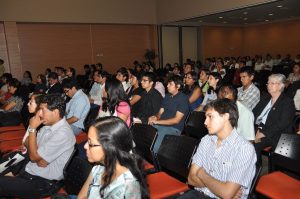Promoting Scientific Publications from Authors Overseas
PLOS NTDs Deputy Editor Daniel Bausch reflects on a Manuscript Writing Workshop recently conducted in Lima, Peru.
On February 19, 2014, PLOS Neglected Tropical Diseases and the American Journal of Tropical Medicine and Hygiene held a manuscript writing workshop in Lima, Peru, as part of the annual Peru satellite meeting of the American Society of Tropical Medicine and Hygiene (ASTMH). Amy Morrison and I, both PLOS NTDs Deputy Editors living and working in Peru, discussed our approach to writing, reviewing, and editing scientific manuscripts with a group of about 200 young Peruvian scientists.

Some of the obstacles to publication from authors overseas are obvious, such as the language barrier in a scientific world presently dominated by English. Others are more subtle, and perhaps more universal. How do you get started? What journal do you choose? What happens if you get rejected? The intimidation of young writers (naively thinking that peer-review is a perfect system!) was palpable. Amy and I did our best to go through the various steps of writing, submission and review. I think it helped for the young scientists to see that people who write and review and edit manuscripts are just “real people.” No intimidation necessary. Amy and I probably learned as much as the attendees; going through each step (how do you write the Abstract? the Intro? the Methods?), we often discovered that we had slightly different approaches and pointers to offer.
Clearly there’s more than one way to write a good manuscript. The session was too short, and the group perhaps too large, to get into detailed discussion, so we both would advocate a smaller, longer, and more hands-on approach next time, perhaps asking participants to bring one of their current draft manuscripts to work on. Along those lines, U.S. Naval Medical Research Unit No. 6 in Lima, a major sponsor of the meeting, will soon conduct an informal abstract writing session, pairing more experienced researchers and writers with young scientists to help them get their abstracts in shape for submission and presentation at the next ASTMH annual meeting in New Orleans.
PLOS NTDs has now supported manuscript writing workshops in Peru and Turkey with more planned for this year, and along with the American Journal of Tropical Medicine and Hygiene is exploring ways to continue to give researchers overseas the tools they need to publish their work. Slide sets on manuscript writing, in English and Spanish (with other languages to come) are available at www.plosntds.org/static/resources
Author bio: Daniel Bausch, MD, MPH&TM, is a Deputy Editor for PLOS NTDs and Council Member for ASTMH. He lives in Lima, Peru, where he works on research and control of zoonotic and vector-borne tropical viruses in association with the Tulane School of Public Health and Tropical Medicine, New Orleans, LA and the U.S. Naval Medical Research Unit No. 6 in Lima. He has no conflicts of interest to declare.

It’s great to read about this, you provided your Peruvian colleagues with a terrific service. If only there could be more opportunities like this. I did research abroad for a decade, and faced similar questions of my foreign colleagues. Helping non-native English speakers get published is essential for science and research. Otherwise, we all miss out on worlds of new ideas and results.
[…] more information or questions about the Writing Workshops, please email us at plosntds and see our Speaking of Medicine article on a workshop hosted by PLOS NTDs Deputy Editors Daniel G. Bausch and Amy C. Morrison in 2014 in […]